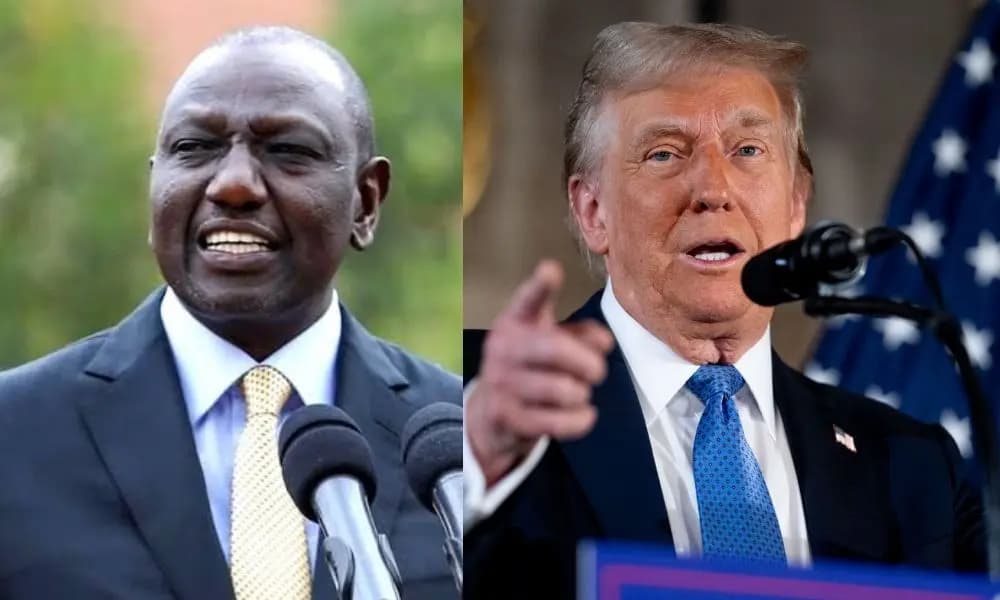We're loading the full news article for you. This includes the article content, images, author information, and related articles.
Kenya has signed a $175,000-per-month contract with Continental Strategy LLC to lobby Washington ahead of President William Ruto’s visit, signalling Nairobi’s intent to strengthen U.S. ties amid global geopolitical rivalry and ongoing trade and security agendas.

Nairobi, Kenya – Kenya has signed a 12-month lobbying contract with Washington-based Continental Strategy LLC, marking a significant diplomatic move ahead of President William Ruto’s planned meeting with U.S. President Donald Trump next month.
Filed under the U.S. Foreign Agents Registration Act (FARA), the agreement authorises the firm to lobby U.S. federal officials, distribute informational material, and advise on political strategy. Kenya will pay a retainer of $175,000 per month (about KSh 22 million) plus travel and accommodation expenses. Dr. Korir Sing’oei, Principal Secretary in the Ministry of Foreign Affairs, is named as the official Kenyan contact. The contract renews automatically unless cancelled with 30 days’ notice.
The lobbying deal comes just weeks before Ruto addresses the United Nations General Assembly in New York and later holds a bilateral meeting with Trump in Washington. Observers say Nairobi’s decision reflects the high stakes of U.S.–Kenya relations, where trade, security, and diplomacy intersect.
Kenya has long been a critical U.S. ally in East Africa, hosting American military facilities and contributing troops to regional peacekeeping operations. Yet Ruto’s April 2025 state visit to Beijing signalled a deepening relationship with China, raising concerns in Washington that Nairobi could tilt further east.
By securing representation in Washington, Kenya is effectively rebalancing its foreign policy, ensuring that its ties with the U.S. remain robust even as it expands partnerships with Beijing.
At the heart of Ruto’s Washington agenda will be the future of the African Growth and Opportunity Act (AGOA), a preferential trade programme set to expire in 2025. Kenya is one of the largest African beneficiaries, exporting textiles, tea, coffee, and horticultural products duty-free into the U.S. market. Nairobi will push for either an extension of AGOA or a bilateral free trade agreement to guarantee continued access.
Security cooperation will also dominate discussions. Kenya leads the U.N.-backed multinational mission to Haiti, a role supported by Washington both financially and diplomatically. Nairobi will seek additional U.S. backing for the mission as it becomes increasingly central to global debates on fragile-state interventions.
Kenya’s lobbying contract is also viewed through the lens of great-power competition. Washington and Beijing are vying for influence across Africa, investing heavily in infrastructure, energy, and defence ties. Kenya—strategically located, economically dynamic, and regionally influential—has emerged as a prize partner in this rivalry.
China remains Kenya’s largest bilateral creditor, financing highways, railways, and energy projects.
The U.S. remains indispensable for security, technology, and preferential market access.
By hiring Continental Strategy, Kenya signals its determination to avoid being boxed into one camp, instead playing both powers to its advantage.
This is not Kenya’s first foray into U.S. lobbying. Since the 1960s, successive administrations have retained Washington firms to advocate for aid, security assistance, and trade privileges. Analysts note that such contracts, though costly, can deliver returns if they open doors in Congress and the White House.
“This is a strategic investment. Kenya cannot afford to lose visibility in Washington at a time when U.S. foreign policy is being recalibrated under Trump,” said a Nairobi-based diplomat.
As Ruto prepares for his first face-to-face meeting with Trump, expectations are high. Nairobi hopes to secure commitments on:
Trade: Extension or replacement of AGOA, possibly a bilateral trade pact.
Security: Continued support for counterterrorism and Haiti peacekeeping operations.
Investment: Encouraging U.S. private-sector capital into Kenya’s infrastructure and tech economy.
How much the lobbying effort translates into concrete policy gains will depend on the negotiations in Washington—and Kenya’s ability to balance its U.S. and Chinese partnerships without alienating either side.
Keep the conversation in one place—threads here stay linked to the story and in the forums.
Sign in to start a discussion
Start a conversation about this story and keep it linked here.
Other hot threads
E-sports and Gaming Community in Kenya
Active 9 months ago
The Role of Technology in Modern Agriculture (AgriTech)
Active 9 months ago
Popular Recreational Activities Across Counties
Active 9 months ago
Investing in Youth Sports Development Programs
Active 9 months ago